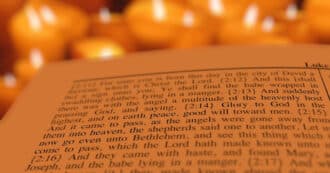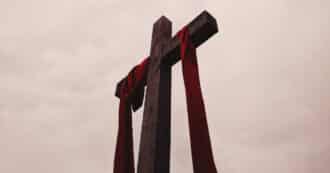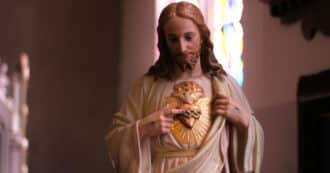The Rev. Dr. Leah D. Schade
God is raising up good shepherds, leaders who Christians can support as they work to protect and preserve people and the planet.
Here are ideas for preaching and teaching Jeremiah 23:1-6 and Psalm 23. This is part of the EcoPreacher 1-2-3 series to equip preachers and congregations for engaging the Bible through an ecological lens. These texts are assigned as part of the Revised Common Lectionary for July 21, 2024, the Ninth Sunday after Pentecost, Year B.
Eco-Exegesis
Eco-exegesis is a method of interpreting the biblical text through a green lens using the principles of ecological theology.
Jeremiah 23:1-2
Woe to the shepherds who destroy and scatter the sheep of my pasture! says the Lord. . . So I will attend to you for your evil doings, says the Lord.
The Hebrew prophet Jeremiah watched his nation succumb to military invasion, desecration of their holy places, idol worship, and sacrificing children. His prophetic oracle laid the blame for this devastation squarely at the feet of the temple leaders and royal court whose members were unfaithful to God’s covenant. Jeremiah called out these corrupt leaders as “shepherds who destroy and scatter the sheep” (23:1).
As the U.S. faces an election in 2024, it’s important to look at the platforms of candidates to see which ones would “destroy and scatter the sheep.” Are their stances and policies aimed to protect and preserve people and the planet, or to exploit and pollute them?
For instance, the architects of Project 2025, the right-wing conservative action plan for implementing policy for a second Trump term, would decimate American climate and environmental policy. The Project 2025 plan is to rollback regulations on the oil and gas industry and strip away climate and environmental protections. Shockingly, this includes eliminating the Office of Children’s Health Protection at the EPA. Woe to these shepherds who would open the door for more children to suffer from things like asthma and lead poisoning.
Jeremiah says that God will “attend” to these corrupt leaders. What’s interesting is the intentional play on the Hebrew word, paqad. God is basically saying, “You have not paid attention to my people, so now I’m going to pay attention to you for what you’ve done (or failed to do).” It emphasizes the evilness of neglect and negligence of duty.
In contrast, the text says God will “raise up shepherds over them who will shepherd them, and they shall not fear any longer, or be dismayed, nor shall any be missing” (Jer. 23:4). In light of the U.S. 2024 election, this contrast should inform how Christians vote. There is only one presidential candidate, Joe Biden, who has enacted policies that provide strong protections against carbon pollution and who spurred a clean energy renaissance. The choice for future leadership is clear.
Psalm 23:1-3
1 The Lord is my shepherd, I shall not want.
2 He makes me lie down in green pastures; he leads me beside still waters;
3 he restores my soul. He leads me in right paths for his name’s sake.
In the Bible, the image of the good shepherd is a metaphor for the tender benevolence and fierce protectiveness of God. We can’t miss the fact that in Psalm 23, God’s restoration, instruction, and generosity are situated within a healthy, clean, and flourishing environment. By extension, then, those who serve as “shepherds” (leaders) in our own time must also ensure that the natural world can foster a healthy, clean, and flourishing community.
One example of leaders who exemplify “good shepherds” is Third Act, a national organization of elders in the U.S. who work to stabilize the climate and protect democracy. This intrepid group of Americans aged 60+ has organized the “Summer of Heat” campaign to shut down fossil-fuel-funding banks and stop their climate-destroying activities. Over 12 weeks, local groups working with other climate organizations are engaging in creative, nonviolent civil disobedience.
Third Act can provide resources and support for older members in congregations who want to use their life experiences, skills, and resources to ensure a safe and stable planet for future generations. They work with young people, local communities, and other national climate movements to elect leaders “who prioritize climate action and uphold democratic values at the federal, state, and local levels” (Third Act website). These are “good shepherds” who are using their wisdom, energy, and chutzpah to make positive change.
Churches can encourage their own elders to embrace the role of wise, experienced shepherds who share their expertise, guidance, and bold ideas for pushing back against climate chaos. Rather than seeing their age as a liability or hindrance, our age 60-and-up folks can draw on their skills, experience, and community connections to protect our climate and ensure a livable future.
The Eco-Idea is one succinct statement that tells us who God is and/or what God does in relation to Creation and how we should respond as people of faith.
God is raising up good shepherds, leaders who Christians can support as they work to protect and preserve people and the planet.
Eco-Questions are what we can ask to help a congregation draw out the implications of the Eco-Exegesis and Eco-Idea.
- Who are your local and state candidates for office and what is their stance and record on keeping communities healthy and protecting against climate and environmental pollution? Who exemplifies being “good shepherds” that are worthy of our votes as Christians concerned about God’s Creation?
- Who are the vibrant, active elders in your church and community that can provide leadership in the climate movement? What are ways that your congregation can equip, connect, and empower them to be “good shepherds” for the current and future generations of climate activists?
Eco-Actions are ways that a congregation might respond to the Eco-Idea and Eco-Questions. One of these possibilities may have salience for your ministry context.
- Educate your congregation by hosting a forum on climate, faith, and elections in your church. Invite local candidates to explain their stances and policies on climate and environmental issues. (This is allowed for churches as long as all candidates are invited to speak, even if they do not all accept the invitation.)
- Encourage people to volunteer with organizations such as Environmental Voter Project and to learn about the environmental records of candidates through Interfaith Power & Light’s project, Faith Votes.
Host a gathering of elders in your congregation and community who are interested in finding out more about Third Act and how they can put their expertise and skills to work to protect democracy and preserve our precious planet.
*Featured image source





